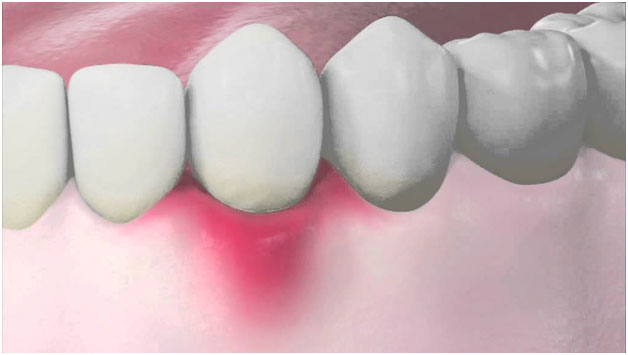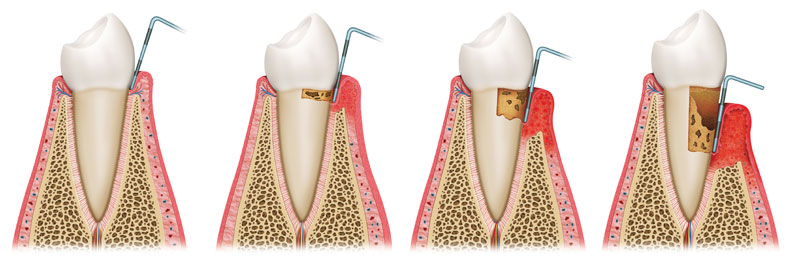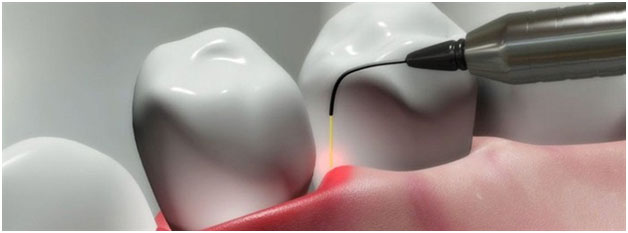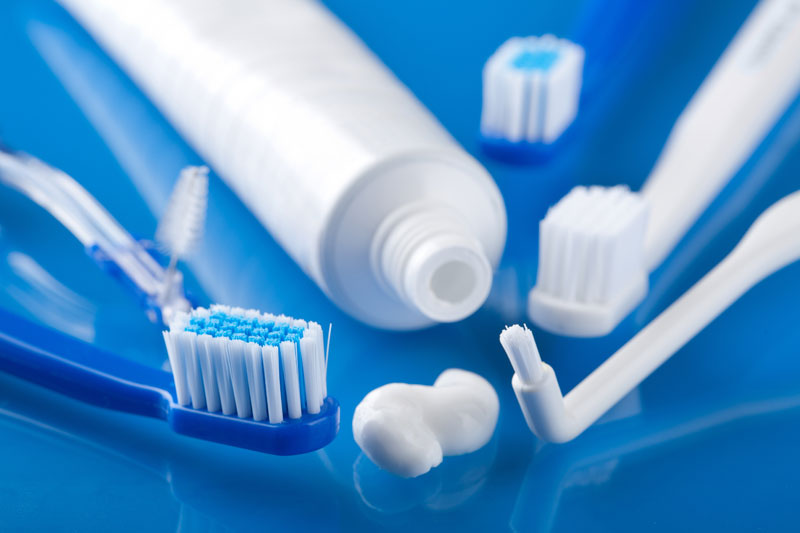Periodontal surgery is a plastic (reshaping) surgical procedure designed to restore and regenerate normal form and function to lost and damaged periodontal structures which support the teeth (the gum tissue, periodontal ligament and bone).

It is thought that tooth loss is an inevitable process as we age, however, it is absolutely possible that your teeth will ”live“ as long as you live. One way to achieve this goal is the prevention of periodontal disease (peri-around, odont-tooth) caused by bacteria that attack it.
Unfortunately, most people do not even know that they have some form of the gum disease, because the symptoms are not always so obvious to the one, while symptoms are more than obvious to the eye of an experienced professional dentist.
A large percentage of people develop gingivitis (gum inflammation) as a result of irregular and ineffective oral hygiene. If the inflammation is not treated on time, the bacterial infection progresses from gingivitis to periodontitis, which will eventually result in resorption (degradation) of the bone structure. As the bone collapses, gums separate from the teeth, forming small pockets in which the toothbrush and floss cannot reach. This is the suitable environment for the growth of the bacteria causing the ultimate loss of teeth. The development of periodontal disease has a genetic predisposition, since periodontitis occurs in several members of one family. Smokers, people with diabetes and other systemic diseases, also belong to the risk group.
The good news is that periodontal disease can be controlled with contemporary approach, even in an advanced stage.
Signs and Symptoms of Periodontal Disease
It is important to know that you might have some periodontal disease without obvious symptoms, especially if you are a smoker – nicotine reduces blood flow to the gums, prevents bleeding and swelling and so mask the real situation. Hence, the particular attention should be payed to the following symptoms:

- Bleeding gums – it is thought that gum bleeding occur due to rough brushing. Although this method of brushing the teeth is poor (among other things leads to their withdrawal), it should not cause gum bleeding. Every trace of blood is a signal that some form of the disease does exist.
- Bad breath – plaque can easily accumulate in the spaces between the teeth, thus creating a favourable environment for growth of bacteria. Their products – rich in sulphur compounds cause bad breath.
- Redness and gum enlargement – gingival inflammation is usually the first visible sign of ill-affected periodontium.
- Receding gums – if you notice that your teeth look longer than before, probably the withdrawal of the gums has developed thus leaving treeless roots.
- Hypersensitivity – if the gums withdrawal occurred, the parched roots of the teeth can become sensitive to hot and cold, while very inflamed gingiva become already painfully sensitive to the touch.
- Periodontal abscessis purulent collections concentrated in the periodontal pocket or the area around the tooth. Infected zone becomes swollen and painful to the touch. If there is a spontaneous drainage of purulent content, there may be unpleasant taste in the mouth, and bad breath.
- Loosening of teeth – due to the degradation of bone, teeth lose their support, they begin to sway and migrate.
Treatments

Each treatment begins with the assessment of oral hygiene techniques and instructions on how to improve it, along with professional dental cleaning. Local application of antibiotics may be needed at different stages of treatment to accelerate the healing process and reduction of pocket depth and ultimately avoid surgery.
Sometimes, due to belated treatment, surgery is needed to remove deep periodontal pockets. There are different types of surgery for curing the periodontal disease.
Modern periodontology, in most cases, by combination of different procedures successfully manages to reduce the number of operations and the cost of the treatment.
The interventions carried out in the treatment of periodontal condition are:
:
- Removal of dental plaque and tartar with the appropriate instruments and appliances
- Curettage of periodontal pockets
- Flap surgery (surgical removal of deep periodontal pockets where part of the oral mucosa in the form of a lobeis lifted)
- Gingivoplasty (method of treatment of gingival pockets, it is also used for aesthetic purposes)
- Gingivectomy (method of treatment of periodontal pockets)
- Extraction of teeth, parts of teeth or roots (hemisections, bisection of the teeth or root resection)
A team of specialized dentists and renowned experts are running all kinds of these procedures at our DENTAL CLINIC ”RODA“. The latest materials and appliances in order to achieve the best therapeutic results are used as well as providing more pleasant and comfortable clinic experience for your comfort zone.
Periodontal Disease and Your General Health

Periodontal diseases arise in your mouth, but they are associated with more serious conditions such as cardiovascular disease, diabetes or premature childbirth. Research suggests two mechanisms that enable this cause – consequential relationship:
- Moderate to severe periodontal disease increases the level of bodily inflammation; local inflammation causes systemic inflammation, which is characteristic of all chronic inflammatory diseases
- Bacteria that are found in periodontal pockets, are often encountered in a plaque of blood vessels, hence the need to rehabilitate periodontal inflammation and thus affect the systematic inflammation
Prevention

The best way to prevent the occurrence of periodontal disease is regular and effective brushing and use of dental floss. Regular dental controls and professional teeth cleaning every 3-6 months are equally important to preserve the health of your gums. Instruments and appliances used in dental clinic can reach areas inaccessible to the toothbrush and dental floss. Visual examination, as well as examination with specific instruments that determine the depth of the space between surface of the tooth and surrounding gingiva (depth of the pocket), can detect early stages of periodontal disease and be promptly repaired. Also, X-rays register state of bone tissue and the degree of progression of the infection.
There are, of course, steps that can be taken independently; eat balanced and healthier foods, reduce stress and get rid of the bad habits such as smoking.
With the joined efforts, the goal at the beginning of this text will not be so elusive any more – that your teeth will ”live“ as long as you will live.


